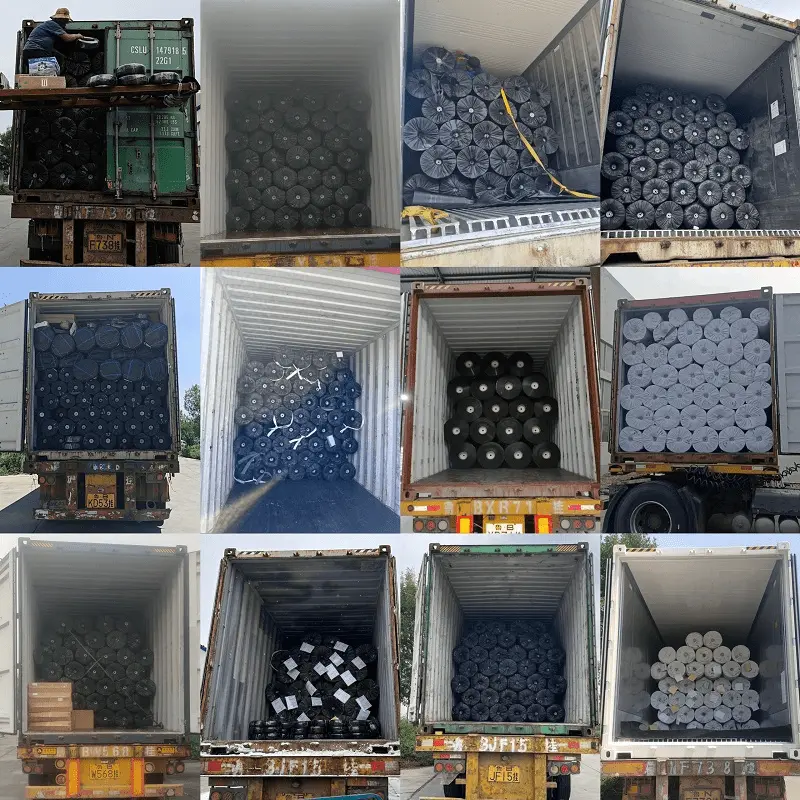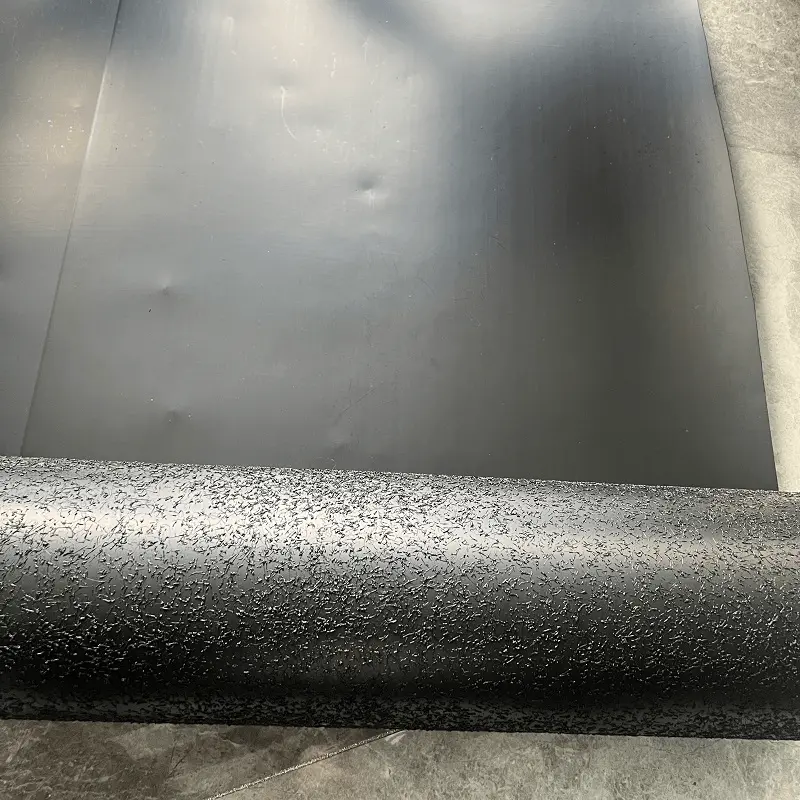1. Introduction
High-density polyethylene (HDPE) geomembranes have emerged as indispensable materials in the fields of environmental protection, mining, landfills, and water conservancy engineering. Their excellent impermeability, chemical resistance, and durability make them the preferred choice for various projects. Bengal, a region with significant infrastructure development needs, presents a vast market for HDPE geomembranes. This article delves into the specifics of 0.5mm, 1mm, 1.5mm, and 2mm HDPE geomembranes, focusing on their performance characteristics, technical parameters, and potential applications in Bengal.
2. Overview of HDPE Geomembranes
HDPE geomembranes are polymeric sheets with extremely low permeability coefficients, typically ranging from 10⁻¹¹ cm/s to 10⁻¹³ cm/s. They are manufactured using high-density polyethylene resin and are available in various thicknesses, including 0.5mm, 1mm, 1.5mm, and 2mm. These geomembranes can be produced with smooth or textured surfaces and come in different colors to suit specific project requirements.
3. Technical Parameters of Different Thicknesses
The following table outlines the key technical parameters for 0.5mm, 1mm, 1.5mm, and 2mm HDPE geomembranes:
| Thickness (mm) | Density (g/cm³) | Tensile Yield Strength (N/mm) | Tensile Breaking Strength (N/mm) | Elongation at Break (%) | Tearing Load at Right Angle (N) | Anti-Puncture Strength (N) |
|---|---|---|---|---|---|---|
| 0.5 | ≥0.940 | ≥11 | ≥20 | ≥700 | ≥93 | ≥240 |
| 1.0 | ≥0.940 | ≥15 | ≥27 | ≥700 | ≥125 | ≥320 |
| 1.5 | ≥0.940 | ≥22 | ≥40 | ≥700 | ≥190 | ≥480 |
| 2.0 | ≥0.940 | ≥29 | ≥53 | ≥700 | ≥250 | ≥540 |
These parameters ensure that the geomembranes meet the stringent requirements of various engineering projects, providing reliable performance in terms of strength, durability, and impermeability.

4. Performance Characteristics
4.1 Impermeability
HDPE geomembranes exhibit exceptional impermeability, effectively preventing the leakage of liquids and gases. This property is crucial in applications such as landfills, where the containment of hazardous waste is paramount. The low permeability coefficient of HDPE geomembranes ensures that contaminants do not seep into the surrounding soil and groundwater, protecting the environment and public health.
4.2 Chemical Resistance
These geomembranes are highly resistant to a wide range of chemicals, including acids, alkalis, oils, and salts. This makes them suitable for use in environments where exposure to harsh chemicals is inevitable, such as in chemical storage tanks, industrial wastewater treatment plants, and mining operations. The chemical stability of HDPE geomembranes ensures their long-term performance and reduces the need for frequent replacements.
4.3 UV Resistance
HDPE geomembranes are treated to withstand prolonged exposure to ultraviolet (UV) radiation. This is particularly important in outdoor applications, where the geomembranes are exposed to sunlight. The UV resistance of these materials prevents degradation and maintains their physical and mechanical properties over time, ensuring their effectiveness in protecting the underlying structures.
4.4 Mechanical Strength
The high tensile strength, tear resistance, and puncture resistance of HDPE geomembranes make them suitable for use in challenging environments. They can withstand the stresses and strains associated with installation, as well as the loads imposed by the surrounding soil and structures. This mechanical strength is crucial for ensuring the long-term integrity of the geomembranes and the projects they protect.
4.5 Durability
The durability of HDPE geomembranes is a key factor in their widespread use. They are designed to withstand the effects of aging, environmental exposure, and chemical attack over extended periods. Laboratory and field studies have shown that HDPE geomembranes can maintain their performance characteristics for decades, providing reliable protection for the projects they serve.

5. Applications in Bengal
5.1 Landfills
In Bengal, the increasing urbanization and population growth have led to a corresponding increase in waste generation. Landfills are essential for the safe disposal of this waste, and HDPE geomembranes play a crucial role in preventing the leakage of leachate into the surrounding environment. The 1.5mm and 2mm HDPE geomembranes are particularly suitable for landfill applications due to their high strength and impermeability. They can effectively contain the waste and prevent contamination of the soil and groundwater.
5.2 Water Conservancy Engineering
Bengal’s tropical monsoon climate and abundant water resources make water conservancy engineering a critical sector. HDPE geomembranes are used in various water conservancy projects, such as reservoirs, canals, and irrigation systems. The 0.5mm and 1mm geomembranes are often used for lining small water bodies and irrigation channels, while the 1.5mm and 2mm geomembranes are used for larger reservoirs and canals. Their impermeability ensures efficient water storage and distribution, reducing water loss through seepage.
5.3 Mining Operations
The mining industry in Bengal is another significant user of HDPE geomembranes. These materials are used for lining tailings ponds, heap leach pads, and other mining-related structures. The 1mm and 1.5mm geomembranes are commonly used in these applications, providing a barrier against the seepage of mining effluents and protecting the surrounding environment from contamination.
5.4 Agriculture
In agriculture, HDPE geomembranes are used for lining irrigation ponds, fish farms, and other water storage facilities. The 0.5mm and 1mm geomembranes are ideal for these applications due to their flexibility and ease of installation. They help conserve water resources and improve agricultural productivity by reducing water loss through evaporation and seepage.
6. Market Prospects
The market for HDPE geomembranes in Bengal is expected to grow significantly in the coming years. The region’s rapid urbanization, industrialization, and infrastructure development will drive the demand for these materials in various sectors. The government’s focus on environmental protection and sustainable development will also contribute to the increased adoption of HDPE geomembranes in landfills, water conservancy projects, and other environmental applications.
Furthermore, the cost-effectiveness of HDPE geomembranes compared to traditional materials, such as clay and concrete, makes them an attractive option for project developers. The ease of installation and maintenance of these geomembranes also reduces project costs and downtime, further enhancing their market appeal.
7. Conclusion
In conclusion, 0.5mm, 1mm, 1.5mm, and 2mm HDPE geomembranes offer a range of performance characteristics that make them suitable for various applications in Bengal. Their excellent impermeability, chemical resistance, UV resistance, mechanical strength, and durability ensure reliable protection for the projects they serve. As the region continues to develop and invest in infrastructure, the demand for HDPE geomembranes is expected to grow, presenting significant opportunities for manufacturers and suppliers in the industry. By understanding the specific requirements of different projects and selecting the appropriate geomembrane thickness, stakeholders can ensure the successful implementation of their projects and contribute to the sustainable development of Bengal.
![]() 1.5 Double-sided smooth HDPE geomembrane.pdf
1.5 Double-sided smooth HDPE geomembrane.pdf

897.webp)
942.webp)
237.webp)